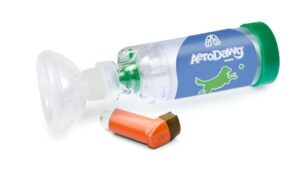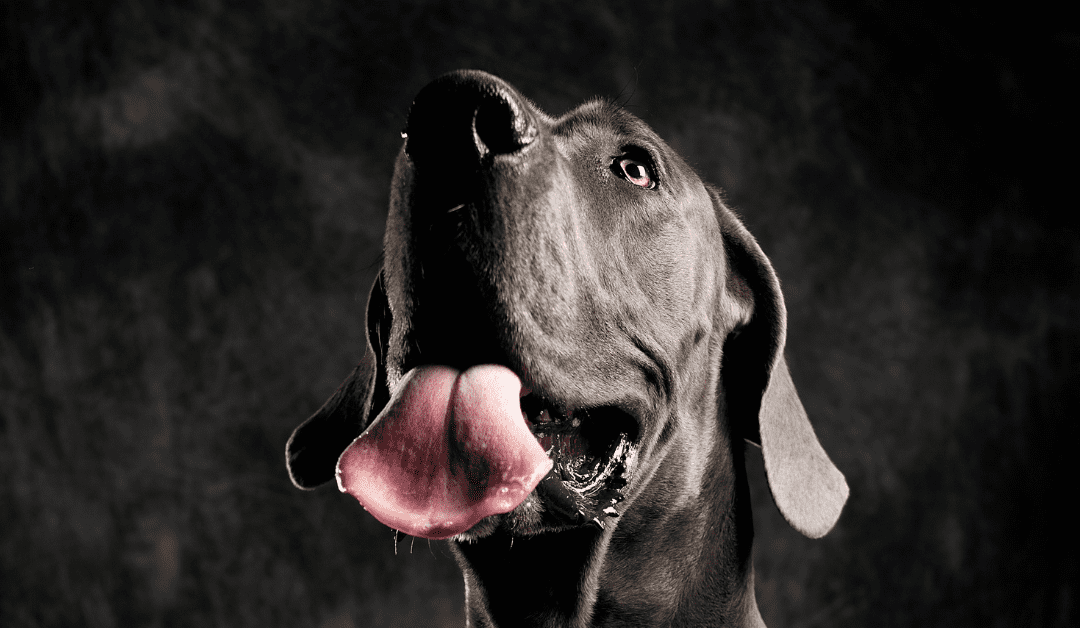Canine chronic bronchitis is a lot more common than you might think. So, what is canine chronic bronchitis, what causes it and how can you manage it more effectively? Read on to discover …
What is canine chronic bronchitis?
Canine Chronic Bronchitis is a long-term inflammatory condition of the lower airways and it is the most common cause of chronic coughing in dogs. All breeds can be affected, but it is particularly common in older and smaller breeds, such as toy poodles and cocker spaniels.
Chronic bronchitis is characterised by persistent inflammation of the lower airways and excessive mucus production. This leads to mucus build-up and difficulty breathing. If left untreated, canine chronic bronchitis can cause irreversible structural changes to the airways. This is because chronic inflammation results in fibrosis (thickening and scarring of airway tissue), which further restricts airflow and exacerbates breathing difficulties.
How is chronic bronchitis diagnosed in dogs?
There is not one specific test that can definitively diagnose canine chronic bronchitis. Instead, vets use a process of elimination to rule out other causes of coughing, such as infection, parasites or heart disease. This diagnostic process may include chest X-rays, blood tests, and cytology or cell counts from lung washes (bronchoalveolar lavage). These tests help identify signs of inflammation and exclude other conditions.
If your dog exhibits a specific combination of clinical signs (or symptoms), such as a persistent cough without evidence of infection or other underlying causes, this may lead your vet to a preliminary diagnosis of chronic bronchitis. Further monitoring and response to treatment may help confirm the condition.
What are the signs of chronic bronchitis in dogs?
The signs of chronic bronchitis in dogs can vary from mild or moderate, to severe and may include one or all of these signs:
- Persistent cough (often productive, i.e. bringing up mucus)
- Wheezing
- Retching
- Cyanosis (blue gums) in severe cases
It is best to contact your vet as soon as you notice any of these signs. Cyanosis is a veterinary emergency and you should see a vet as soon as possible for treatment. In all cases, the earlier canine chronic bronchitis is identified the better the prognosis (outlook) for your dog.
How is canine chronic bronchitis treated?
Canine chronic bronchitis needs to be medically treated by vets and managed at home by owners. The main aims of treatment are to:
- Reduce airway inflammation
- Control coughing
- Prevent further damage to the airways
Medications used to manage chronic bronchitis in dogs include:
- Steroids – to reduce airway inflammation
- Bronchodilators – to dilate (widen) the airways and make it easier to breathe
- Cough suppressants – to reduce coughing, which in turn reduces further irritation and damage to the airways
- Antibiotics –only prescribed if a secondary bacterial infection is present alongside the chronic bronchitis
Steroids are the cornerstone of canine chronic bronchitis treatment, and they will need to be prescribed by a vet. Steroids can be administered by injection, orally, or via inhalation. Inhaled steroids are often preferred for long-term use because they target the airways directly, minimising systemic absorption and reducing the risk of side effects.
Long-term medical management can significantly improve clinical signs and slow the progression of airway damage. With appropriate treatment, most dogs with chronic bronchitis can enjoy a normal life expectancy and maintain a good quality of life.

What is the AeroDawg® Chamber?
The AeroDawg® chamber is a spacer device that transfers medication from an inhaler to your pet’s nose and mouth where they can breathe it in via a mask. Most dogs can be trained to use the device in a matter of days.
Shop the AeroDawg® here.

How can canine chronic bronchitis be managed at home?
There are several simple things you can do from home to help manage your dog’s chronic bronchitis.
- Reduce exposure to irritants – avoid contact with indoor cigarette smoke, pollen, pollutants, dust, and mould.
- Manage weight – being overweight can worsen your dog’s cough and lung function so weight management is important. Your vet will be able to recommend a weight loss programme for your dog if necessary.
- Control exercise – it’s important not to over-exert your dog during exercise as this can trigger coughing and breathing difficulties. You should also avoid sudden excitement, as this can trigger a coughing episode.
- Use a harness – harnesses may be better than collars for dogs with chronic bronchitis as it reduces the direct pressure on the windpipe.
To find out more about canine chronic bronchitis, visit our news page or to purchase an AeroDawg®, check out our AeroDawg® page.
For more tips on respiratory health for cats, dogs, and horses and regular updates on the BreathEazy products or for regular updates on our latest blogs, visit either our Facebook, LinkedIn or Instagram.

